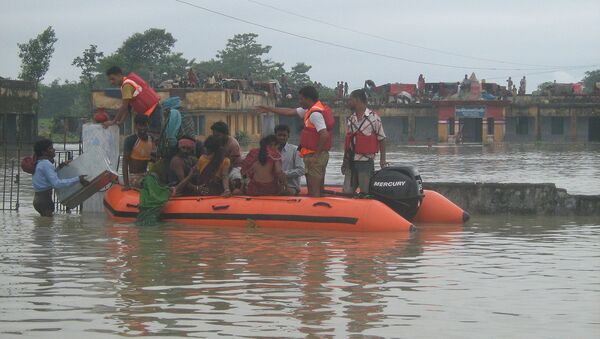"Thank you! I am literally witnessing God in orange uniform, on the orange boat", was the reaction of a helpless mother when India's National Disaster Response Force (NDRF) rescued her 20-day-old daughter from a flood-ravaged district and had the bundle of joy placed back in her arms.
Deputy Commandant Aditya Pratap Singh, NDRF, who rescued her baby with the help of other personnel, recounts that the woman remarked, "first time in my life, I have experienced God in the form of a rescuer".
Similarly, Inspector Vikas Mehra of the NDRF tells Sputnik about an ingenious way devised by a personnel member to rescue two children who were scared to step into their boat amid the swelling waters.
"The personnel spotted the kids' inflatable bath tub in the house and said, 'This is your tub, mate! Would you mind stepping into this one?' Both the kids sat in the tub and were rescued".
Pic 1: This woman got to hold her 20-day-old daughter again after the NDRF personnel rescued them from a flood -hit area in Kerala.
— Pratibha Sharma (@PratibhaScribe) August 19, 2020
Pict 2: When scared kids refused to step into the NDRF boat, they devised an ingenious method.#WorldHumanitarianDay2020 @NDRFHQ @SputnikInt pic.twitter.com/5Xj8LAzxya
The incidents occurred in the southern Indian state of Kerala, which is currently being battered by heavy rainfall and flood-like situations. The state's Idukki district also witnessed a deadly landslide in August that claimed over 60 lives, with many people still missing.
India's National Disaster Response Force was constituted in 2016 with eight battalions, which have now grown to 12 - each battalion consisting of 1,149 personnel. While they all have a jurisdiction to serve, the magnitude of disasters often surapasses it.
The force is actively operating to rescue people from a flood in northern Karnataka, Bihar, and Assam. They are in operation to save people from deadly landslides in Uttarakhand's Pithoragarh district and even rains in Mumbai.
While a few survivors called them the "god in orange boats", other still call them up to express gratitude for saving their lives. @NDRFHQ #WorldHumanitarianDay @SputnikInt pic.twitter.com/tuXVwMCHMm
— Pratibha Sharma (@PratibhaScribe) August 19, 2020
Anil Shekawat, consultant, disaster mitigation, tells Sputnik that this is the monsoon season and the heavy rains lead to landslides and floods, especially in hilly areas.
"As per the past experiences, we pre-deploy our team to mitigate and provide immediate assistance to the flood-affected and landslide victims. NDRF is providing a series of awareness campaigns to people in disaster-prone areas with the collaboration of the district disaster management authorities in the monsoon season", Shekawat said.
Moments of Trauma
Disasters often leave a trail of human agony. Rescue personnel are basically soldiers from paramilitary forces trained to be mentally tough and physically robust. So they are also trained to think as a rescuer.
"I try to keep professionalism above emotions. But sometimes it's not possible to maintain that boundary. When the disaster is of a bigger magnitude strikes and operation goes on for days, the smell of dead bodies doesn't leave your mind. It stays with you for eon, even for life", Aditya explained.
The situation is called post-traumatic stress disorder (PTSD), a mental health condition where severe anxiety is triggered by terrifying events in the form of flashbacks. Aditya states that for this, the personnel are offered counselling by the medical branch after such rescue operations.
The National Disaster Management Authority's guidelines also focus on all aspects of the psycho-social support and mental health services (PSSMHS) of the survivors and personnel.
"Once I realised that the flood water in which we washed our hands before taking the lunch had a body of cow floating in it. I couldn't get that thought out of my head for many days", Aditya recounts.
The rescue troops, who also endure the bitterness of relatives who fail to understand the nuances of a rescue operation in the moment of crisis, try to be sympathetic at the time. They wade through long-drawn crises by braving extreme weather conditions, sharing limited food, and having each other's backs during moments of weakness.
When Home With Family
While people prefer to travel away from unstable areas to ones that are safe and comfortable, NDRF personnel are used to travelling from stable environments into chaos. While their families often worry about their safety, they also provide them with exemplary support to prioritise their duty.
"I told my four-year-old daughter that I won't be able to make it to her birthday as I was busy with a flood rescue operation. I had tears in my eyes when she said it's okay dad, people need you there", he recollected.
Aditya states that survivors often call him to thank not just him, but make a point to speak to his father and little daughter to narrate how he saved their lives.
"It's in those moments of gratitude, we find our peace".





